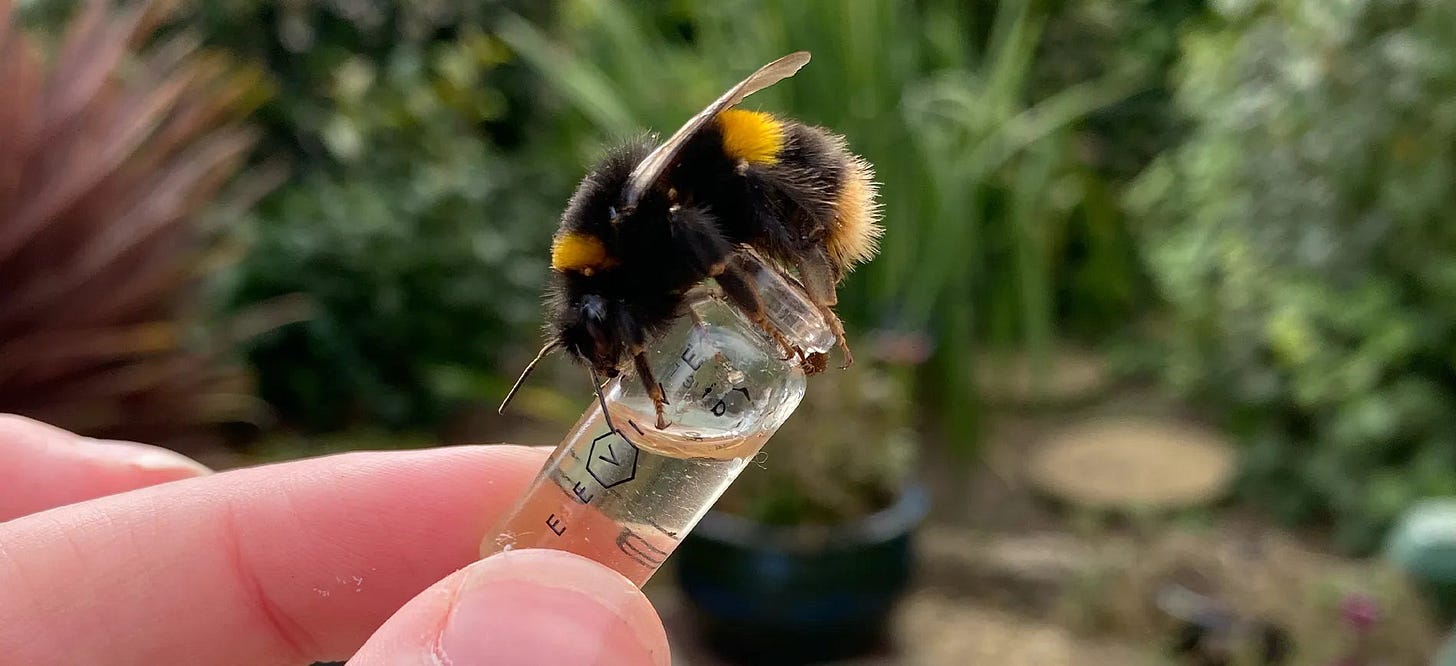Published on July 2, 2025 10:09 PM GMT
I wrote a reply to the Bentham Bulldog argument that has been going mildly viral. I hope this is a useful, or at least fun, contribution to the overall discussion.
“One pump of honey?” the barista asked.
“Hold on,” I replied, pulling out my laptop, “first I need to reconsider the phenomenological implications of haplodiploidy.”
Recently, an article arguing against honey has been making the rounds. The argument is mathematically elegant (millions of bees, fractional suffering, massive total harm), well-written, and emotionally resonant. Naturally, I think it's completely wrong.
Below, I argue that farmed bees likely have net positive lives, and that even if they don't, avoiding honey probably doesn't help them. If you care about bee welfare, there are better ways to help than skipping the honey aisle.

Bentham Bulldog’s Case Against Honey
Bentham Bulldog, a young and intelligent blogger/tract-writer in the classical utilitarianism tradition, lays out a case for avoiding honey. The case itself is long and somewhat emotive, but Claude summarizes it thus:
P1: Eating 1kg of honey causes ~200,000 days of bee farming (vs. 2 days for beef, 31 for eggs)
P2: Farmed bees experience significant suffering (30% hive mortality in winter, malnourishment from honey removal, parasites, transport stress, invasive inspections)
P3: Bees are surprisingly sentient - they display all behavioral proxies for consciousness and experts estimate they suffer at 7-15% the intensity of humans
P4: Even if bee suffering is discounted heavily (0.1% of chicken suffering), the sheer numbers make honey consumption cause more total suffering than other animal products
C: Therefore, honey is the worst commonly consumed animal product and should be avoided
The key move is combining scale (P1) with evidence of suffering (P2) and consciousness (P3) to reach a mathematical conclusion (P4→C) that honey causes more total suffering despite individual bees mattering less than larger animals.
Where I agree with Bentham’s Bulldog
It might surprise you to learn that I agree with BB that there are a lot of bees. (Claude for example estimates 5 trillion bees in 100+ million hives). I also agree that conditional upon being able to suffer, many bees plausibly suffer greatly. Finally, I agree that many bees suffering greatly, if true, is a big deal.
Where I disagree
(Un)fortunately, I disagree with pretty much everything else. Working backwards:
- I disagree with the (implicit) assumption that you should always avoid things that cause a lot of suffering. This is primarily because you should look at the balance of suffering against positive moral goods like pleasure.I disagree, with low credal resilience, with the claim that bees suffer at 7-15% the intensity of humans.Conditional upon bees having the ability to suffer greatly, it is likely that they are also capable of feeling pleasure greatly.On balance, I think it’s likely that farmed bees have net positive lives.
- I think many EAs take it as a given that insects have net negative lives. I think this is a mistaken inference drawn from swapping intuitions of K-selected species unto the actual experiences of r-selected species.For eusocial insects like bees in particular, evolution ought to incentivize them to have net positive lives as long as the hive is doing well overall.Beekeepers are further incentivized to keep their hives living and healthy, which likely is a positive contributor to farmed bee welfare.Bees are not locked down and have exit options like swarming. Thus, revealed preferences point towards them preferring to be in managed hives over wild ones.Finally, the empirical evidence for welfare is both limited and mixed but in my opinion points mildly towards farmed bees having net positive lives, or at least better than pollinators in the wild.
- The main exception I think might be strong suffering-focused or asymmetry views, where you may believe that causing a lot of suffering is bad even on consenting individuals who overall feel much more pleasure than suffering, and want to be alive.
- Not eating honey may not do much to reduce the honeybee population, as many beekeepers are paid more from pollination than from honey.Successfully reducing the honeybee population significantly will likely lead to a (much) higher number of wild pollinators, which may have lives that are overall worse than in managed honeybee populations.
To briefly elaborate on #1, bubonic plague caused significant suffering and death. Therefore, bubonic plague is bad. However, the agricultural revolution has also caused significantly suffering and death (for example, because the agricultural revolution has led to bubonic plague). This does not by itself mean the agricultural revolution is bad, at least according[...]
Discuss

